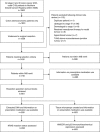Statin use, candidate mevalonate pathway biomarkers, and colon cancer survival in a population-based cohort study
- PMID: 28524155
- PMCID: PMC5518863
- DOI: 10.1038/bjc.2017.139
Statin use, candidate mevalonate pathway biomarkers, and colon cancer survival in a population-based cohort study
Abstract
Background: Statin use after colorectal cancer diagnosis may improve survival but evidence from observational studies is conflicting. The anti-cancer effect of statins may be restricted to certain molecular subgroups. In this population-based cohort study, the interaction between p53 and 3-hydroxy-3-methylglutaryl coenzyme-A reductase (HMGCR) expression, KRAS mutations, and the association between statin use and colon cancer survival was assessed.
Methods: The cohort consisted of 740 stage II and III colon cancer patients diagnosed between 2004 and 2008. Statin use was determined through clinical note review. Tissue blocks were retrieved to determine immunohistochemical expression of p53 and HMGCR in tissue microarrays and the presence of KRAS mutations in extracted DNA. Cox proportional hazards models were used to calculate hazard ratios (HRs) and 95% confidence intervals (CIs) for colorectal cancer-specific and overall survival.
Results: Statin use was not associated with improved cancer-specific survival in this cohort (HR=0.91, 95% CI 0.64-1.28). Statin use was also not associated with improved survival when the analyses were stratified by tumour p53 (wild-type HR=1.31, 95% CI 0.67-2.56 vs aberrant HR=0.80, 95% CI 0.52-1.24), HMGCR (HMGCR-high HR=0.69, 95% CI 0.40-1.18 vs HMGCR-low HR=1.10, 95% CI 0.66-1.84), and KRAS (wild-type HR=0.73, 95% CI 0.44-1.19 vs mutant HR=1.21, 95% CI 0.70-2.21) status.
Conclusions: Statin use was not associated with improved survival either independently or when stratified by potential mevalonate pathway biomarkers in this population-based cohort of colon cancer patients.
Conflict of interest statement
PWH is the Founder and Director in PathXL Ltd. MS-T is a senior advisor to PathXL. All other authors declare no conflict of interest.
Figures


References
-
- Bardou M, Barkun A, Martel M (2010) Effect of statin therapy on colorectal cancer. Gut 59: 1572–1585. - PubMed
-
- Bengtsson E, Nerjovaj P, Wangefjord S, Nodin B, Eberhard J, Uhlén M, Borgquist S, Jirström K, Uhlen M, Borgquist S, Jirstrom K (2014) HMG-CoA reductase expression in primary colorectal cancer correlates with favourable clinicopathological characteristics and an improved clinical outcome. Diagn Pathol 9: 78. - PMC - PubMed
-
- Bjarnadottir O, Romero Q, Bendahl P-O, Jirström K, Rydén L, Loman N, Uhlén M, Johannesson H, Rose C, Grabau D, Borgquist S (2013) Targeting HMG-CoA reductase with statins in a window-of-opportunity breast cancer trial. Breast Cancer Res Treat 138: 499–508. - PubMed
MeSH terms
Substances
Grants and funding
LinkOut - more resources
Full Text Sources
Other Literature Sources
Medical
Research Materials
Miscellaneous

